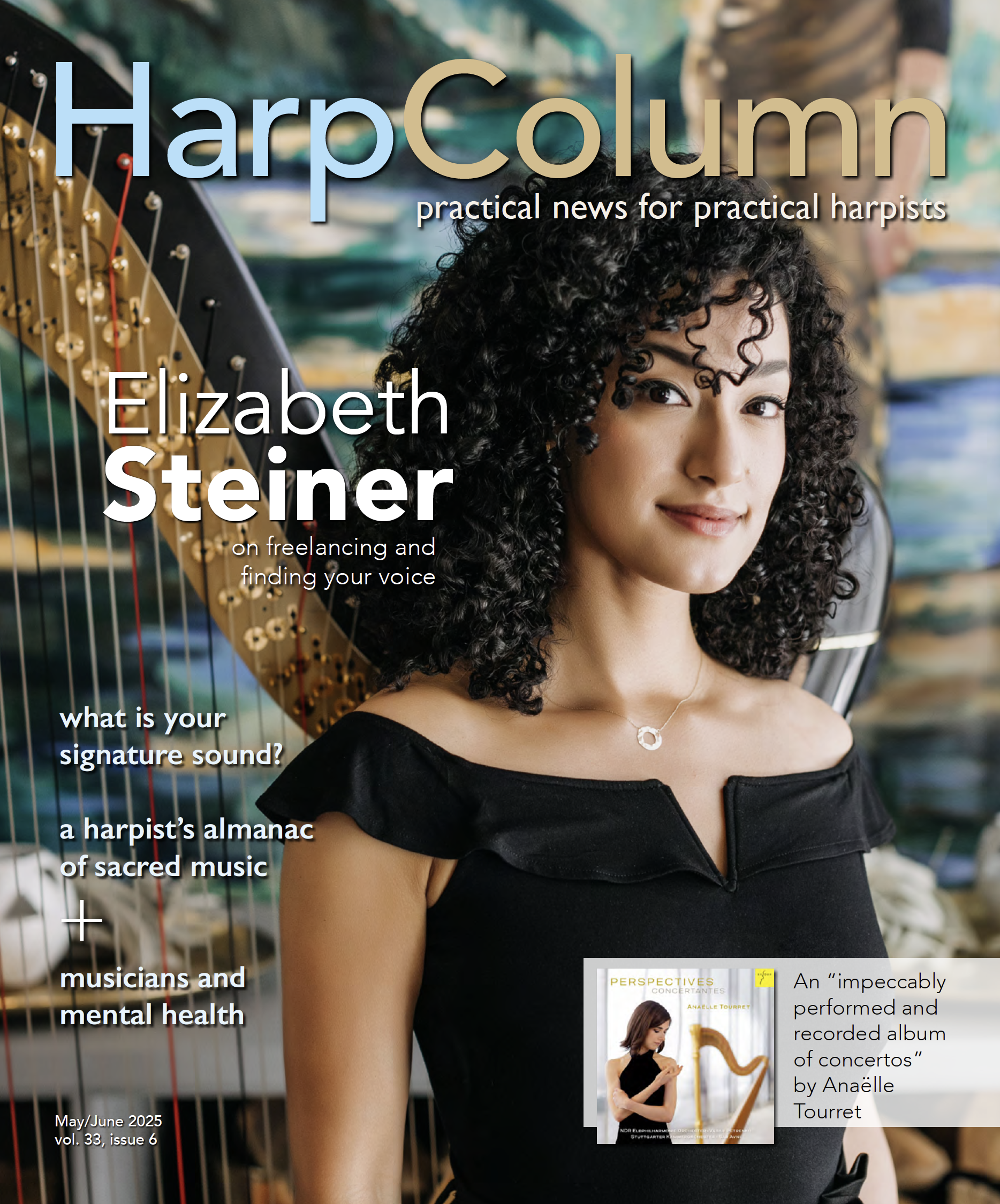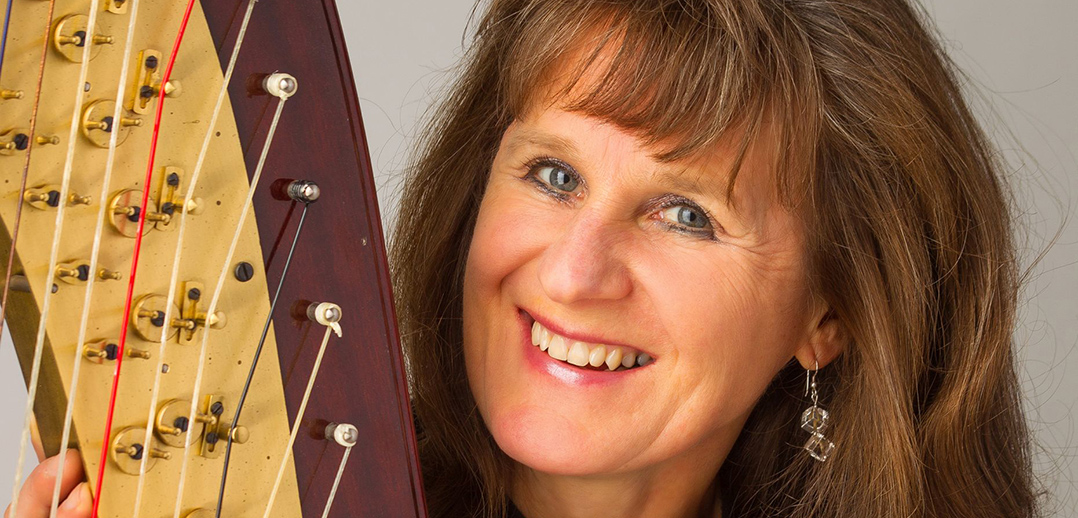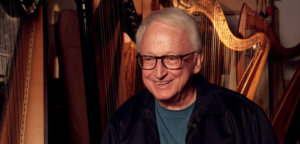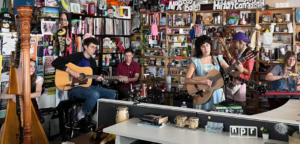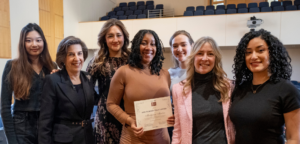Anyone who makes a living as a freelancer knows how difficult it is to earn a paycheck without a steady employer. Concerts, workshops, teaching, arranging, recording—most freelancers piece together their own career puzzle using a variety of musical tactics. Austrian harpist Monika Stadler is no different, and after 25 years in the business, she is the inspirational proof we all need to show that making a living as a performing harpist is possible if you’re willing to do the hard work of being your own production company. We caught up with Monika to find out how she did it.
So, you are celebrating your 25th stage anniversary this year? What does that mean and why is it important?
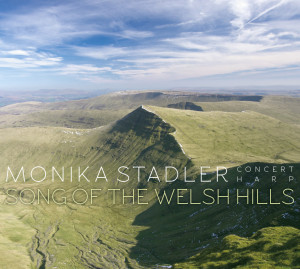 Yes, I am celebrating my 25th stage anniversary this year. It means a lot & I am very happy, thankful and proud that I have made it thus far. It really is a dream come true.
Yes, I am celebrating my 25th stage anniversary this year. It means a lot & I am very happy, thankful and proud that I have made it thus far. It really is a dream come true.
In those 25 years I have been blessed by performing all over the world at festivals, large and small, in many varied and beautiful venues where I have been able to perform my own music and undertake many of my own projects.
I have been lucky enough to be able to make my living performing, composing and teaching workshops/master classes about jazz, improvisation, and creative playing for harpists as well as for other different instruments. Along the way I have also somehow found time to produce and release 11 CDs as well as publish eight music books with the main publisher of Austria and also Tim Creighton’s Collection.
I love working in duos when performing so have collaborated with many different musicians & their instruments such as piano, percussion, sax, ethnic flutes, tuba, violin, cello, accordion, acoustic double bass, digeridoo, kora, guitar, berimbau, mouth organ, vibraphon & so on… All this of course means organizing the traveling, concerts, and promotion work in addition to planning the programs, rehearsing, and networking with key people in many varied situations.
You have made a career from performing your original music. How have you done it?
I started composing when in the USA studying with Deborah Henson Conant and some teachers from the Berklee College of Music in Boston. At this time I focused on jazz music. On my return [to Austria], in 1993, I started contacting concert organizers in Austria and began performing my own music. Slowly, slowly over the years, I became more well known in Austria and beyond in Europe through the newspapers, radio, TV and by performing as much as possible as well as having various film-makers using my music too.
How do you promote yourself?
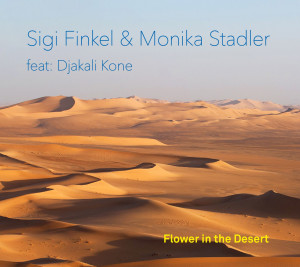 This was, and still is, the hardest thing for me. In the beginning I sent radio stations, TV, and newspapers my CD’s and talked to the concert organizers. Later on I used some agencies to promote the latest CDs and they organized some concerts for me, mainly in Austria, Germany and Croatia. However, agencies are not management and I therefore still had to do a lot by myself. This is made more difficult when my music doesn’t neatly fit into a genre box but, of course, creativity doesn’t always conveniently fit into known genre boxes.
This was, and still is, the hardest thing for me. In the beginning I sent radio stations, TV, and newspapers my CD’s and talked to the concert organizers. Later on I used some agencies to promote the latest CDs and they organized some concerts for me, mainly in Austria, Germany and Croatia. However, agencies are not management and I therefore still had to do a lot by myself. This is made more difficult when my music doesn’t neatly fit into a genre box but, of course, creativity doesn’t always conveniently fit into known genre boxes.
What are the biggest challenges you’ve faced?
As a performer with no regular monthly income, I had to trust that I will always earn enough money to survive and overcome my fear that there will be times without income and without performances/workshops. In the end I always played enough concerts but I was always aware that nothing was certain.
Another big challenge was when I developed a frozen shoulder first in the left and then the right shoulder. Being self-employed, I couldn’t take sick leave and it can take up to 18 months to heal. I am sure you can imagine how difficult it was to continue performing when movement is restricted and when it hurts like crazy.
What’s the best advice you can give a harpist who wants to make a living from performing?
In terms of the typical music industry world I am afraid I cannot give advice. They can find that from many sources (e.g. books or Internet about the music industry itself). Personally, though, my advice would be to take care of your body as much as you can. Eat healthily and don’t forget to exercise. The harp is the instrument you are playing and performing on but the first instrument is your body, mind, and soul.
I would also say follow your heart and listen to what you really want to achieve and desire. Ask yourself if you are up to a lot of hard work and willing to put a lot of effort and love into your project even when your income doesn’t always come in right away.
Of course, a lot depends on which musical genre you want to pursue—classical, jazz, pop, or whatever. These are different worlds, plus it can also depend in which country you are living too.
What’s your most memorable performance?
That was the first concert I played in Hanoi, Vietnam. They gave me such an old harp, full of dust and two missing strings in the middle register, which could only be replaced by guitar strings, because they didn’t have harp strings and I didn’t take any with me because they said it was an orchestral harp and they would provide strings. I never, ever travel without strings after that!
Tell us about your music. Are you always coming up with new things?
It seems that I become inspired by being out in nature, by traveling, by my emotions, by being with people, by different life situations, by listening to and playing with other instruments, by different cultures and by learning new techniques. After my time in the USA, I focused on jazz and slowly started to compose not only in a jazzy style, but also influenced by how a place, a situation or feeling wanted to be expressed. A lot of my compositions develop out of improvisations and by just playing around but sometimes the theme is there right away.
And how about your new CD—what’s on it and what can people expect to hear?
Well, since we talked in May I have already another new CD out. So there are now two new CDs. Song Of The Welsh Hills includes only original compositions inspired by the unspoiled landscape, the pristine coastline, and music of Wales, by my love of the tango, by a Breton dance. Flower In The Desert is a collaboration with my sax player and, as a guest, a kora player. The compositions are originals of both the sax player and I plus one from the kora player with a lot of space for improvisations.
Anything else you want to share with our Harp Column readers?
It is such a real gift to be able to play the harp, and even more so to be able to make a living from it, although it can also be very demanding. If you want to follow your own musical path don’t give up, follow your intuition, listen deep inside yourself and follow your dreams. But still be aware of the realty and the normal world around you. To be creative can make you very happy.
Find out more about Monika Stadler on her website at www.harp.at




